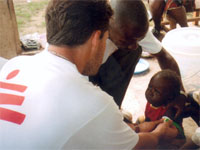A U.N. Security Council Briefing Delivered by Catherine Dumait-Harper, MSF Representative to the U.N.
A U.N. Security Council Briefing Delivered by Catherine Dumait-Harper, MSF Representative to the U.N.

An MSF volunteer tests a Liberian child for malnutrition using the 'bracelet of life.' |
Your Excellencies,
I would like first to thank Ambassador Durrant of Jamaica for inviting Médecins Sans Frontières and our colleagues to discuss the humanitarian situation in Liberia, where the conflict is having severe consequences for the civilian population. We will focus mainly on the state of the internally displaced persons (IDPs) who have fled the fighting in Lofa county. As you will see in the description of our programs, MSF is currently providing all the medical care (including nutritional programs), most of the water and sanitation, and a lot of the shelter in three of the five NGO-supported camps, for about 24,000 IDPs.
As Oxfam mentioned, and as the Secretary-General pointed out in paragraph 28 of his latest report on Liberia (S/2001/939), there has been a huge drop in funding by donor states since 1998, and MSF has had to carry out all these programs on private funds. Along with other NGOs and the ICRC, we have been able to keep the situation under control, but cases of severe malnutrition and bloody diarrhea have meant that we have to be constantly vigilant. MSF cannot continue such a diversity of programs at this capacity much longer, and we would like to see other NGOs take more of a role in the non-medical activities we are currently carrying out.
On August 16, MSF sent to the Security Council a letter raising our main concerns about Liberia. MSF welcomes the press statement made by the President of the Security Council, Ambassador Valdivieso, the following day, which drew attention to the fighting in Lofa and urged donor states to show their commitment to Liberia. Unfortunately, two months later, our preoccupations are still the same: there is still no protection for the populations and almost no donor support for essential humanitarian activities.
Although the health and nutritional condition of the population remains under control and most of the fighting is currently restricted to upper Lofa County, about 2500 newly displaced arrived at Jenne Manna camp (in Grand Cape Mount county) in late August, many in poor health conditions after walking for days and nights in the bush. Most of them arrived from Sierra Leone, where they had not received any humanitarian assistance, and included several hundred Sierra Leonean refugees in this camp who have not so far been registered by UNHCR. MSF regularly goes to the town of Kongbo (on the border with Sierra Leone) to monitor new arrivals.
We remain concerned about the fact that there is no form of protection at all for these civilians, and that the safety conditions in the camps are not guaranteed, as many of these are in locations that make the civilians particularly vulnerable to attack, forced recruitment, or other exactions by different armed groups. Our team in Jenne Manna explains clearly to the IDPs that, as a humanitarian organization, we cannot guarantee their safety.
MSF still does not have regular access to much of Lofa county. During assessment missions in the region, we came across destroyed villages and towns, but also found pockets of civilians who prefer to stay in their village so as to take care of their crops, despite nearby fighting. But those in the camps, who have already missed the planting season, show no intention of returning to Lofa in the near future, nor is it likely they could do so safely.
A final point we would like to make is that, in examining Liberia, we believe that it is crucial that the Security Council take into consideration the precarious situation throughout the region, in Sierra Leone, Guinea, and also the Ivory Coast. For instance, MSF has seen several thousand Liberian refugees, from Lofa, in Kailahun (Sierra Leone), which is very insecure; in Guinea, little is known of what is taking place in Macenta.
In the last Arria meeting at which MSF addressed the Security Council, in April 2000, we called on you to make the protection of civilians in armed conflicts a priority. We want to renew this call for the population in West Africa. We also ask that you support the UNHCR in fulfilling its mandate in the region. I would also like to underscore the imperative for civilian populations to have unimpeded access to humanitarian assistance, and for parties to the conflict to ensure access for humanitarian organizations, in accordance with the principles of humanity, neutrality and impartiality.
Thank you.



